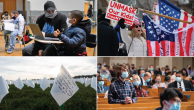
5 Years Later: America Looks Back at the Impact of COVID-19
Nearly three-quarters of U.S. adults (72%) say the COVID-19 pandemic did more to drive the country apart than to bring it together.
Numbers, Facts and Trends Shaping Your World
All
Publications
Nearly three-quarters of U.S. adults (72%) say the COVID-19 pandemic did more to drive the country apart than to bring it together.
A majority of teens prefer in-person over virtual or hybrid learning. Hispanic and lower-income teens are particularly likely to fear they’ve fallen behind in school due to COVID-19 disruptions.
Most workers who say their jobs can mainly be done from home say they are fine with the amount of time they spend on video calls.
In April 2021, we followed up with many of the same parents surveyed in March 2020 on their children’s use of technology and social media.
Here is what our surveys found about the students most likely to lack the home internet connectivity needed to finish schoolwork.
Nine-in-ten Americans say the internet has been essential or important to them, many made video calls and 40% used technology in new ways. But while tech was a lifeline for some, others faced struggles.
Roughly half of Americans say that they have been getting some (30%) or a lot (18%) of news and info about COVID-19 vaccines on social media.
Some 15% of all home broadband users in the U.S. say they have had trouble paying for their high-speed internet service during the pandemic.
Some of Americans’ pandemic adaptations have relied on technology, including adults working from home and students learning online.
Lee Rainie, director of internet and technology research at the Pew Research Center, presented this material on October 14, 2020 at a gathering sponsored by the International Institute of Communications. He described the most recent Center public opinion surveys since mid-March, covering the impact of the COVID-19 outbreak, racial justice protests that began in the summer, and the final stages of the 2020 presidential election campaign.
Notifications